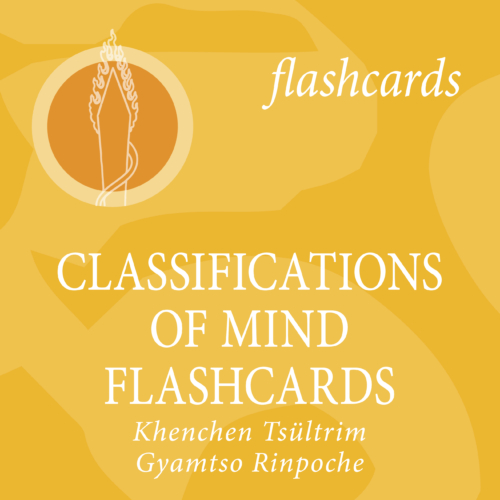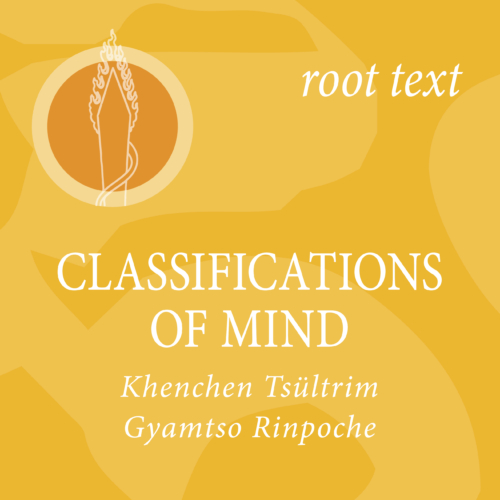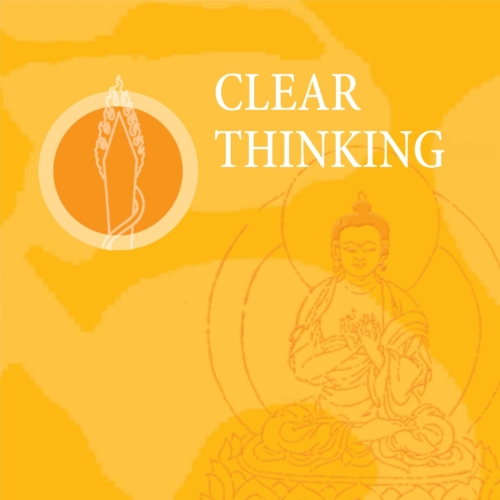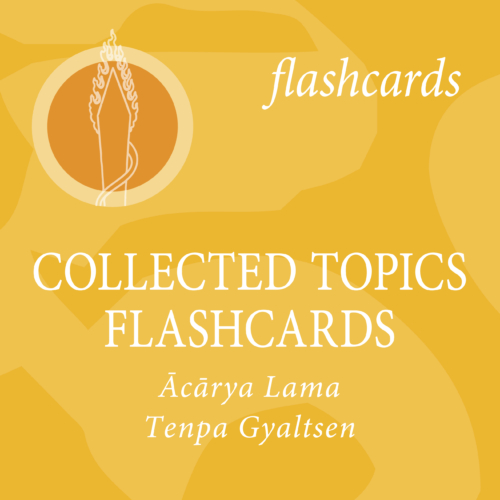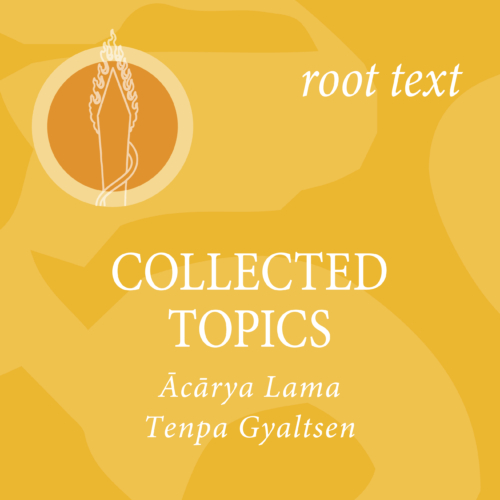-
 新版《心与心的世界1》和《心与心的世界2》对应英文版的两本同名手册,两本加起来是对堪布仁波切所著的原典《心的科学:逻辑海典心髓》的完整的释论。新版替代2021中文版的《心的科学:逻辑海典心髓释论》。新版按照英文版编排,并增加了阿阇黎谢拉布嘉诚的释论,和每课后的分析式禅修和闻思题。 《心与心的世界1》详细分析作为体验者的这个心,它如何以如实和不如实的方式感知世界,原典《心的科学:逻辑海典心髓》教导心的分类,法教源泉是陈那和法称的量论学传统。要点是区分哪些面向的心如实地感知现象本来的样子,哪些面向的心是错乱迷惑的,并束缚我们于轮回。手册还介绍了基础乘中有部和经部关于二谛和感知理论的宗义思想。每一课包括课外阅读、分析式禅修、闻思题。
新版《心与心的世界1》和《心与心的世界2》对应英文版的两本同名手册,两本加起来是对堪布仁波切所著的原典《心的科学:逻辑海典心髓》的完整的释论。新版替代2021中文版的《心的科学:逻辑海典心髓释论》。新版按照英文版编排,并增加了阿阇黎谢拉布嘉诚的释论,和每课后的分析式禅修和闻思题。 《心与心的世界1》详细分析作为体验者的这个心,它如何以如实和不如实的方式感知世界,原典《心的科学:逻辑海典心髓》教导心的分类,法教源泉是陈那和法称的量论学传统。要点是区分哪些面向的心如实地感知现象本来的样子,哪些面向的心是错乱迷惑的,并束缚我们于轮回。手册还介绍了基础乘中有部和经部关于二谛和感知理论的宗义思想。每一课包括课外阅读、分析式禅修、闻思题。 -
 新版《心與心的世界1》和《心與心的世界2》對應英文版的兩本同名手冊,兩本加起來是對堪布仁波切所著的原典《心的科學:邏輯海典心髓》的完整的釋論。新版替代2021中文版的《心的科學:邏輯海典心髓釋論》。新版按照英文版編排,並增加了阿闍黎謝拉布嘉誠的釋論,和每課後的分析式禪修和聞思題。《心與心的世界1》詳細分析作為體驗者的這個心,它如何以如實和不如實的方式感知世界,原典《心的科學:邏輯海典心髓》教導心的分類,法教源泉是陳那和法稱的量論學傳統。要點是區分哪些面向的心如實地感知現象本來的樣子,哪些面向的心是錯亂迷惑的,並束縛我們於輪回。手冊還介紹了基礎乘中有部和經部關於二諦和感知理論的宗義思想。每一課包括課外閱讀、分析式禪修、聞思題。
新版《心與心的世界1》和《心與心的世界2》對應英文版的兩本同名手冊,兩本加起來是對堪布仁波切所著的原典《心的科學:邏輯海典心髓》的完整的釋論。新版替代2021中文版的《心的科學:邏輯海典心髓釋論》。新版按照英文版編排,並增加了阿闍黎謝拉布嘉誠的釋論,和每課後的分析式禪修和聞思題。《心與心的世界1》詳細分析作為體驗者的這個心,它如何以如實和不如實的方式感知世界,原典《心的科學:邏輯海典心髓》教導心的分類,法教源泉是陳那和法稱的量論學傳統。要點是區分哪些面向的心如實地感知現象本來的樣子,哪些面向的心是錯亂迷惑的,並束縛我們於輪回。手冊還介紹了基礎乘中有部和經部關於二諦和感知理論的宗義思想。每一課包括課外閱讀、分析式禪修、聞思題。 -
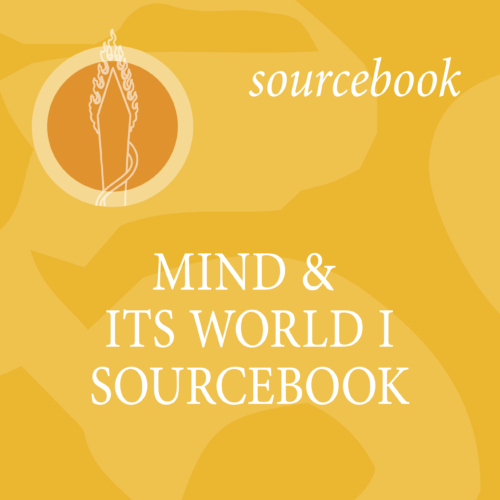 Mind and Its World I begins a detailed analysis of the subjective side of experience. It examines mind and how it perceives its world in valid and invalid ways based on the Classifications of Mind, which provides divisions and definitions of the types of mind identified in the epistemological tradition of Dignaga and Dharmakirti. The key point is the discernment of the aspects of mind that validly perceive things the way they are, which are distinguished from those aspects of mind that are mistaken and tainted by fundamental delusion, and thus keep one bound in samsara. It also introduces the two Hinayana philosophical systems, the Vaibhashika and Sautrantika schools, covering the two truths and the process of perception. Selected readings, analytical meditations, study questions, review summaries are included in the sourcebook. Also available as an eBook for Apple or Android devices.
Mind and Its World I begins a detailed analysis of the subjective side of experience. It examines mind and how it perceives its world in valid and invalid ways based on the Classifications of Mind, which provides divisions and definitions of the types of mind identified in the epistemological tradition of Dignaga and Dharmakirti. The key point is the discernment of the aspects of mind that validly perceive things the way they are, which are distinguished from those aspects of mind that are mistaken and tainted by fundamental delusion, and thus keep one bound in samsara. It also introduces the two Hinayana philosophical systems, the Vaibhashika and Sautrantika schools, covering the two truths and the process of perception. Selected readings, analytical meditations, study questions, review summaries are included in the sourcebook. Also available as an eBook for Apple or Android devices. -
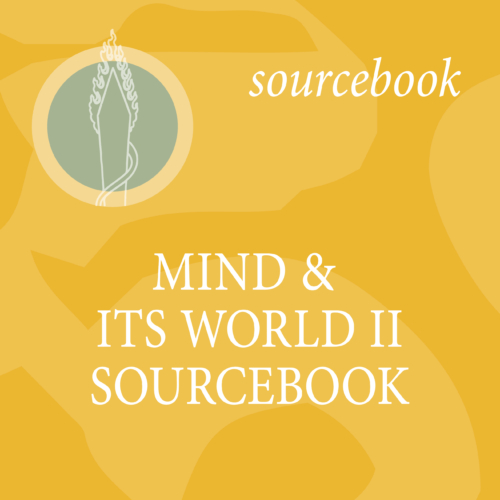 Mind and Its World II examines the theme of karma. It begins the study of causes and conditions as presented in Collected Topics, the twelve nidanas, or chain of interdependent origination, and the distinction between primary minds and mental factors. It includes a detailed presentation of the mental factors from the Classifications of Mind. Selected readings, analytical meditations, study questions, and review summaries are included in the sourcebook. Also available as an eBook for Apple or Android devices.
Mind and Its World II examines the theme of karma. It begins the study of causes and conditions as presented in Collected Topics, the twelve nidanas, or chain of interdependent origination, and the distinction between primary minds and mental factors. It includes a detailed presentation of the mental factors from the Classifications of Mind. Selected readings, analytical meditations, study questions, and review summaries are included in the sourcebook. Also available as an eBook for Apple or Android devices.


